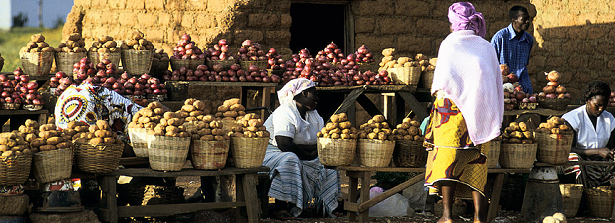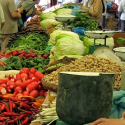Food Systems: how could a food systems approach work for transitions towards SDG2

The Food Systems approach continues to be a key area of interest and exploration among Dutch knowledge institutions, Ministries and other stakeholders, as reflected by several expert meetings and studies during the past few months. They explore the concept of “food systems” further, trying to enhance understanding of what the “food systems approach” is about, and more importantly, how it could work to enhance the food systems transitions required to achieve SDG2 and other sustainable development goals.
This article provides a brief update about these expert meetings and studies, and links to the relevant outcome documents, a video, several publications, and a policy tool.
Food systems analysis for policy
Early December, a report “Food systems: from concept to practice and vice versa” was published by KIT Royal Tropical Institute and Wageningen University, commissioned by the Ministry of Foreign Affairs and the Ministry of Agriculture, Nature and Food Quality of the Netherlands. It summarizes the latest insights in the food systems approach, using system thinking as a starting point: looking at causal maps, boundaries, relationship dynamics, archetypes and leverage points. This report can serve as key resource for all with an interest to further understand and use the concept of food systems. Along these lines, the team also developed a practical decision support tool to apply the food systems lens for country-based policy planning, for example by Netherlands Embassies. This tool was tested for the Embassy in Ethiopia as well as for Burkina Faso and Niger. The outcomes of the latter were shared in a public consultation session for the Dutch Sahel policy in The Hague on December 18, 2018. The tool had generated a rich and comprehensive overview of the cause-effect chains and feedback-loops of agricultural and food challenges in the Sahel region, and highlighted a number of key leverage points for future Dutch policy making.
Global implications of the European food system
At the European level, a public exchange was organized late October based on the WUR scoping study on the global implications of the European food system. It concluded that EU interventions can be improved to enhance impact on the SDGs, through (better) assessment of economic, ecological and social effects of the European role in food systems in LMICs, yet this demands very new ways of multi-actor cooperation.
Food systems research
On October 19, 2018 the conference ‘Towards healthy and sustainable food systems… in an urbanising world’ took place, organised by the WUR Knowledge Base Programmes ‘Global Food & Nutrition Security’ and ‘Metropolitan Solutions’ programmes supported by the Dutch Ministry of Agriculture, Nature and Food Quality. It addressed various elements of an effective food systems approach: methods which focus on both formal and informal markets; strengthening data, methods and frameworks to support food systems decision-making at scale; and accounting for multiple outcomes.
There was general agreement that game changers for a food systems approach were its move away from a production focus towards food and nutrition outcomes, where trade-offs with for instance ecological and social externalities of food systems were managed in multi-stakeholder processes. A short video about this conference can be found here and a report comprising key outcomes and recommendations can be found here.
Multi-stakeholder knowledge sharing about food systems
The Wageningen Economic Research (WEcR) advisory report “The food systems approach: sustainable solutions for a sufficient supply of healthy food“, was the basis for a workshop at the WUR SDG conference in August 2018: “A food systems approach to food & nutrition security – from the theory to the practice“. Jointly organized by WEcR, the Ministry of Agriculture, Nature and Food Quality and the F&BKP, with cases of SNV, Hivos, ECDPM and the Ethiopia Sesame Business Network to explore the relevance of the food systems approach in practice. Key take-aways from these discussions were: Further understanding is needed how a food systems approach could help overcoming key food systems bottlenecks with focused, evidence-based interventions. Second, a need was expressed to develop adequate multi-stakeholder mechanisms for decision making on managing the synergies and the inevitable trade-offs.
How food systems approaches can be made practical, to inform strategic interventions that manage trade-offs and promote synergies will be further explored in 2019. Several institutions in the Dutch network will continue working on this, and F&BKP will foster collaborative learning to make sure insights from practitioners and policy makers are combined with those of knowledge institutions.
| Background information |
| Food Systems: From concept to practice and vice versa By Helena Posthumus and Bart de Steenhuijsen-Piters of KIT Royal Tropical Institute, and Just Dengerink and Sietze Vellema of Wageningen University & Research (November 2018) A decision-support tool for the design of food & nutrition security programming: Bridging concept and practice in the Food System approach The Food Systems Decision-Support Tool: Application in the case of Ethiopia Archetypes: Common systemic behaviours in food systems Global implications of the European Food System: A food systems approach The food systems approach: sustainable solutions for a sufficient supply of healthy food The Food Systems Approach: inspiring an innovative way for SDG2 impact? |







I developed and adopterd, as misterof trade,highly susidiesed Food Ratin System covering all residents in Iraq( Iraqies,Arab’s and Foreigners)during therteen years of UN Sanction emposed on Iraq 1990-2003.policy of incresing food production was cosidered the first priorit.Withe continuos declince of purchasing power of local currency and continuous high inflation rate, most of residents were not able to afford to buy at mrket prices.Thus food ration system adopted to maintain as much as possible the minimum requirements of food at nominal prices.Food basket contained :wheat flour, rice , pulses,cooking oil, tea and suger, Iodized salt, were in cluded in the food basket distributioned through private retailers for each person per12cent of US dollar per mounth.This sistem saved Iraqis from famine and achieved zero hunge during sanction.United Nation considered Iraqi Food Ration System as the largest and most efficient food distribution in the world.
This system cand be partially adopted for poor people until food security iis maintzoned for each inhabitant.
I developed and adopted, as I was Minister of Trade, Food Ration System which saved Iraqi people from famine during 13 years of comprehensive santion emposed on Iraq by Security Council from 1990-2003 All residents in Iraq ( Iraqies, Arabs and foreigners) were coverd in provsion of monthl food basket and equally treated in term of qunntity, quality and nominal prices.United Nation considerd this as the largest and most efficient food distribution system in the world( Washington Post Feb,Second 2003).This System miaintaind SDG2 through continuous provision of food for all residents.Its still running in Iraq.
https://www.washingtonpost.com/archive/politics/2003/02/03/stockpiling-popularity-with-food/a8cc2d7a-1bce-4eb0-8a6a-4d53160ee247/